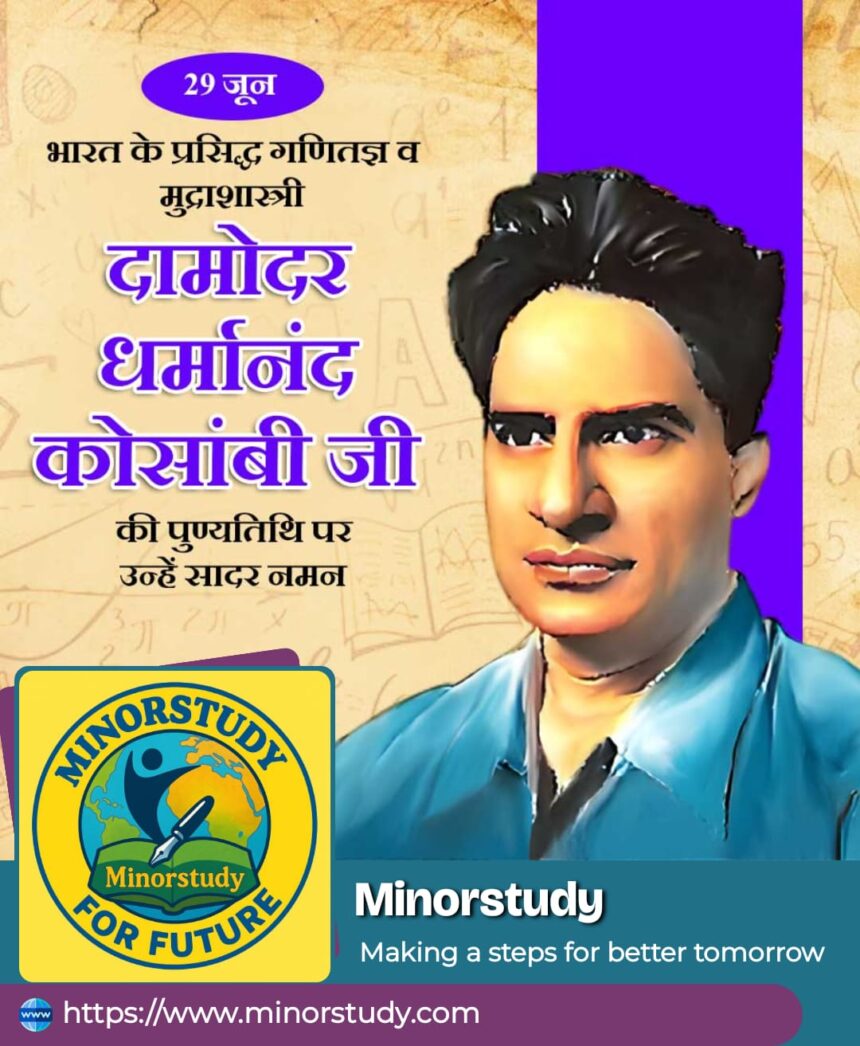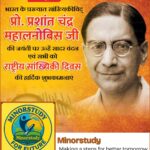Damodar Dharmanand Kosambi Ji: A Revolutionary Mind Who Reshaped Indian History and Thought
In the rich intellectual landscape of India, Damodar Dharmanand Kosambi Ji stands as a towering polymath who reshaped the way we study history, society, and even mathematics. He was not only a pioneering historian and mathematician, but also a Marxist thinker, linguist, and a champion of rationalism.
- 📜 Early Life and Background of Damodar Dharmanand Kosambi Ji
- 📊 9 Brilliant Truths About Damodar Dharmanand Kosambi Ji
- 🕰️ Timeline of His Life and Career
- 📌 Significance of His Contributions
- 1. Transformed Indian Historiography
- 2. Challenged Myths with Rationality
- 3. Humanized Indian History
- 4. Math and History Together
- ❓ Frequently Asked Questions (FAQs)
- Q1: Who was Damodar Dharmanand Kosambi Ji?
- Q2: What is Kosambi most famous for?
- Q3: Was he a historian by education?
- Q4: Did Kosambi Ji belong to any political party?
- Q5: Why is his work relevant today?
- 🧠 Observance and Recognition
- 🎂 Wishing Damodar Dharmanand Kosambi Ji
- 🌍 Impact on Our Daily Lives
- ⚖️ Why Kosambi Ji is Important to Society
- ✅ Conclusion: Damodar Dharmanand Kosambi Ji — The Mind India Still Needs
Kosambi Ji didn’t just interpret India’s past—he reimagined it. His life’s work remains highly relevant today, especially as societies seek to understand themselves better in the context of historical truth, cultural diversity, and class dynamics.
This article delves deep into his life, timeline, contributions, facts, significance, impact, and more, in a human-friendly tone designed to both inspire and inform.
📜 Early Life and Background of Damodar Dharmanand Kosambi Ji
Damodar Dharmanand Kosambi Ji was born on 31 July 1907, in Goa. He was the son of Dharmanand Kosambi, a renowned Buddhist scholar and Pāli expert. Growing up in an intellectually rich environment, Kosambi Ji was exposed early to multilingualism, cultural inquiry, and scientific thinking.
He studied in the United States and graduated from Harvard University at a young age, showcasing his exceptional academic abilities. Despite having a background in mathematics, his curiosity led him to explore Indian history, numismatics, linguistics, and sociopolitical theory, transforming each field he touched.
📊 9 Brilliant Truths About Damodar Dharmanand Kosambi Ji
🧠 Polymath Extraordinaire: Kosambi Ji mastered history, mathematics, Sanskrit, numismatics, and linguistics, showing the rare gift of both rigor and creativity.
📖 Father of Scientific Indian History: He introduced scientific methods, especially Marxist analysis, to Indian historiography.
📚 Author of Groundbreaking Books: His classics like An Introduction to the Study of Indian History (1956) and Myth and Reality (1962) are still essential academic texts.
🔍 Pioneer of Interdisciplinary Thinking: He broke barriers between social sciences and hard sciences.
🧮 Accomplished Mathematician: Contributed to differential geometry and number theory. He even developed the Kosambi–Karhunen–Loève theorem, which has statistical applications.
🏛️ Historian of the People: Focused on common people’s lives, not just kings and wars, offering a bottom-up perspective of history.
💬 Multilingual Scholar: Fluent in Sanskrit, Pāli, Latin, German, and several Indian languages.
🌾 Uncovered Real India: Studied rural India, agricultural practices, and class dynamics long before they were academic trends.
🧭 Radical but Rational: As a Marxist humanist, he sought to free historical study from colonial and idealist biases.
🕰️ Timeline of His Life and Career
| Year | Event |
|---|---|
| 1907 | Born in Goa |
| 1920s | Studied mathematics at Harvard |
| 1930s | Began research in pure mathematics in India |
| 1940s | Shifted focus to ancient Indian history |
| 1956 | Published An Introduction to the Study of Indian History |
| 1962 | Published Myth and Reality |
| 1966 | Passed away, leaving behind a revolutionary intellectual legacy |
📌 Significance of His Contributions
1. Transformed Indian Historiography
Before Kosambi, Indian history was often written from a colonial or religious lens. Kosambi’s materialist approach, rooted in Marxist analysis, emphasized class struggle, economic structures, and everyday life.
2. Challenged Myths with Rationality
In Myth and Reality, Kosambi examined Indian myths not as religious truths, but as historical windows into the social psyche and evolution.
3. Humanized Indian History
Instead of focusing on kings, he spoke about peasants, women, artisans, and tribes—those who were often erased from the grand narratives.
4. Math and History Together
Rarely do we see a mathematician who could also decode ancient texts and coins. Kosambi proved that logic and creativity are not exclusive, but complementary.
❓ Frequently Asked Questions (FAQs)
Q1: Who was Damodar Dharmanand Kosambi Ji?
A: He was an Indian polymath: a mathematician, historian, linguist, and Marxist scholar who revolutionized the study of Indian history through scientific methods.
Q2: What is Kosambi most famous for?
A: For his book An Introduction to the Study of Indian History, and for pioneering a materialist and scientific approach to ancient Indian history.
Q3: Was he a historian by education?
A: No, he was originally trained as a mathematician but evolved into one of India’s most respected historians through independent research.
Q4: Did Kosambi Ji belong to any political party?
A: No, though he was influenced by Marxist ideology, he remained politically unaffiliated and academically independent.
Q5: Why is his work relevant today?
A: His emphasis on scientific truth, human dignity, and intellectual honesty remains essential in our world of misinformation and communal distortions.
🧠 Observance and Recognition
Although there is no official national day in his honor, Kosambi’s legacy is celebrated through:
Lectures, seminars, and symposia by historians and scholars.
Kosambi Memorial Lectures held in various universities.
Academic references in almost all social science and humanities disciplines.
Renewed popular interest in his work during times of social or ideological upheaval.
🎂 Wishing Damodar Dharmanand Kosambi Ji
On the anniversary of his birth (31 July), tributes often pour in from students, historians, and academicians:
✨ “Saluting the towering intellect of Damodar Dharmanand Kosambi Ji. Your pursuit of truth and rationality continues to guide us. Happy Birth Anniversary!”
🧠 “Your fearless analysis and unrelenting curiosity inspire generations. Remembering you with deep respect.”
🌍 Impact on Our Daily Lives
Though Kosambi Ji passed away in 1966, his thinking lives on in ways that touch our lives every day:
Textbooks now include class and caste analysis, inspired by his work.
Modern historiography, including school and college curricula, has moved beyond glorifying empires to understanding real societal shifts.
He taught generations to question rather than accept historical narratives at face value.
Encouraged interdisciplinary thinking—a skill needed in modern careers and policymaking.
His scientific rigor and social empathy remind us to balance intellect with compassion.
⚖️ Why Kosambi Ji is Important to Society
A Radical Humanist: At a time of rising communalism, his inclusive and rational vision is more relevant than ever.
Truth-Seeker: In an age of fake news and historical distortion, his methodology sets the standard for evidence-based scholarship.
Role Model for Students: His versatility proves that passion and curiosity can transcend any academic label.
Defender of the Marginalized: Kosambi gave voice to those lost in history—peasants, women, indigenous communities.
Intellectual Freedom: He showed us how to think independently, challenge norms, and embrace complexity.
✅ Conclusion: Damodar Dharmanand Kosambi Ji — The Mind India Still Needs
Damodar Dharmanand Kosambi Ji was more than a historian or scientist—he was a truth-teller, a question-asker, and a bridge-builder between the past and the present. In today’s era, where history is often manipulated for political convenience, Kosambi Ji’s integrity, rationality, and scholarship shine like a lighthouse.
He reminds us that education without ethics is hollow, and knowledge without empathy is dangerous. By dedicating his life to understanding the real India, he gave us tools to build a better one.
So next time you read about Indian history, ask not just what happened—but who was left out, and why. That question alone honors the legacy of Damodar Dharmanand Kosambi Ji.









An interesting discussion is worth comment. I think that you should write more on this topic, it might not be a taboo subject but generally people are not enough to speak on such topics. To the next. Cheers